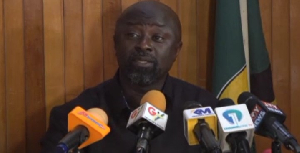A GNA Feature by Gideon Sackitey
Accra, July 5, GNA - Do you remember times in the past when a document moving from one section of a Ministry; Department or Agency (MDAs) could virtually take a whole month, six months or more? One is talking about MDAs that dealt directly with the public notably, Passport Office; Registrar General's Department; Driver and Vehicle Licensing Authority and Town and Country Planning. What about the trouble Pensioners went through at the Controller and the Accountant-General's Department?
Again, do you also remember the times in the past when equipment in some of these MDAs were completely obsolete and archaic and unable to perform their desired functions?
For instance, visitors or clients to most government institutions, especially the MDAs found public officers or secretaries chatting away, working lotto or just apathetic about their approach to work? Some of them just did not show up at their desks, especially after their lunch breaks. In other instances, officers were dead slow in attending to client's demands and requests. Other clients had to wait for several hours or days for a service that could actually be provided in minutes.
One particular situation known to a lot of people was where you were told: "Please Mr so and so is not in. Please go and come tomorrow." Thus you went and came several times and gave up or had to put "weight" on your document to ensure that it did not fly away... sorry; I get lost! In fact, the scenarios cited above and many more might not have changed dramatically but recent visits to certain offices of MDAs revealed that real change was on its way.
One may wonder why? First, is the increased awareness created by competition offered by the private sector and to a large extent the determination of the political authority to effect change by transforming the Civil and Public Services.
The talk usually has been that a well-built private sector depended on an efficient and effective Public and Civil Service ready to see each other grow.
Then came the creation of the Ministry of Public Sector Reform (MPSR) under the able leadership of Dr Paa Kwesi Nduom, a character moulded in top-flight private sector operations, who believes in the concept that the private sector must grow.
He insists "the private sector must and can grow but can only do so if the public sector is empowered to partner it and adequately readied to see the growth through."
The MPSR within months of its birth came up with the idea of Client Services Units (CSU) for the MDAs. The objective is to institute a mechanism for monitoring and evaluating the service provided by the MDAs. The CSUs were charged with monitoring the service delivery and handling of complaints from the public.
KEY FUNCTIONS:
The key goal of the CSUs was to facilitate standardization of the services delivered and to communicate to the public the exact services of the various MDAs as well as the process for complaint handling. It would also deal with complaints from the public regarding services and ensure that genuine problems are addressed adequately. According to Mrs Esther Pokoo Aikins, Head of the Client Services Unit of the Ministry of Public Sector Reform, the Client Services Improvement Project would simplify processes, rules and procedures in the delivery of services to the public.
It is a unit set up to receive complaints and address them and also provide information on the nature of the operations of MDAs. "It is also to provide service to the public in a transparent, timely and cost effective manner. Indeed, the CSUs have been established in selected MDAs for the swift, satisfactory resolution of complaints regarding poor service delivery," she told the GNA. She said clients from every sector of society could easily walk into the CSU, talk to a desk officer trained in software to capture the complaint and push it to the Management for resolution and to send feedback to the customer.
"They (CSUs) actually act as a check on the institutions to improve on service delivery."
Mrs Pokoo-Aikins said so far 23 institutions had been accredited with CSUs with the latest being the DVLA and urged the public to make use of the CSUs that had been established.
"We have spent a lot of money in establishing the CSUs and we must make them work," she said.
The 23 MDAs with CSU's are the Social Welfare Department; Geological Survey Department; Public Works Department; Lands Commission; Department of Cooperatives; Non-Formal Education Division; Ghana Maritime Authority; State Protocol and the Land Title Registry.
The rest are the Controller and Accountant General's Department; Public Records and Archives Administration; Survey Department; Town and Country Planning; Mines Department; Births and Deaths Registry; Registrar General's Department; Accra Metropolitan Assembly; Office of the Head of Civil Service; Bureau of Ghana Languages and the Ministry of Public Sector Reform itself.
BENEFITS
In almost 12 months of the existence of the CSUs, "there are signs that they are bearing fruits and the public as well as the private sector are reaping the rewards already," Mrs Pokoo-Aikins explained. For instance the Ghana Passport Office can now process passports much quicker than before. Reports have it that one can actually get it in about a week. The Lands Commission has also improved its operations making the processing of land documents much easier and efficient. Things have changed and continue to change. However, with the wave of competition from the private sector and the rewards of good service delivery, best practices must become the hallmark of the operations of MDAs if the vision of our forebears is to be realized.
Opinions of Wednesday, 5 July 2006
Columnist: GNA














